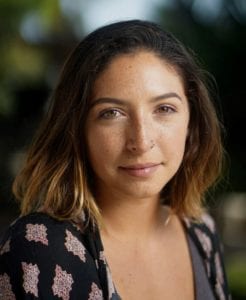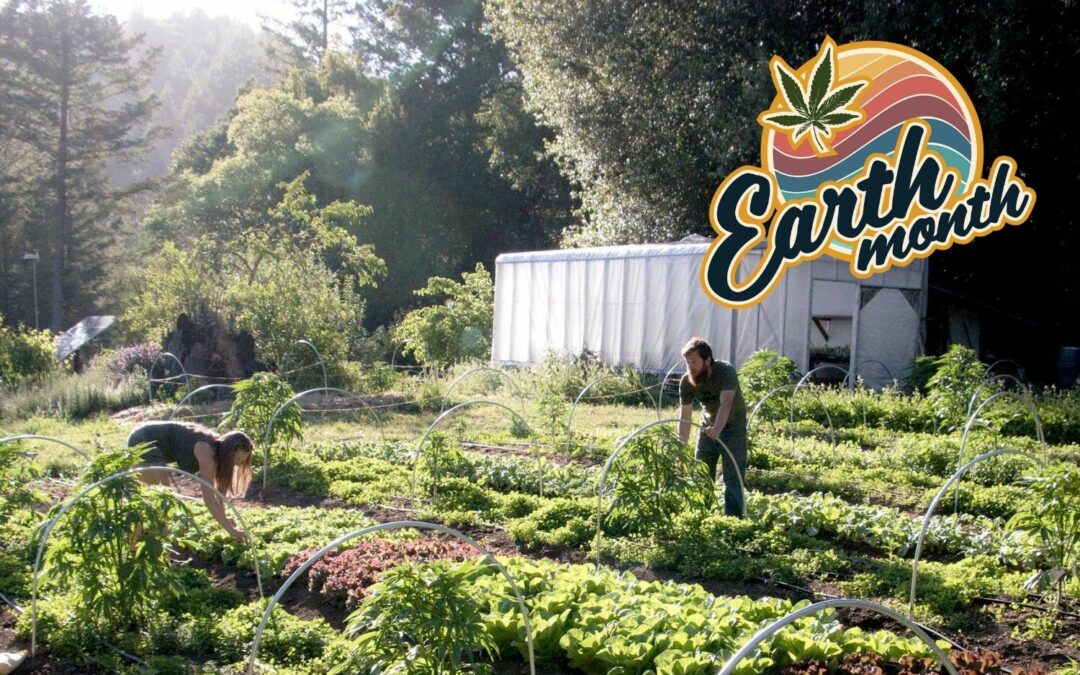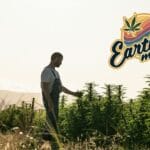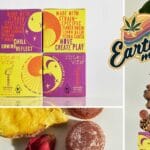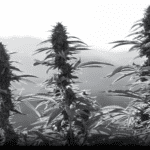I sat down virtually with David Bronner, CEO (Cosmic Engagement Officer) of Dr. Bronner’s and Founder of Brother David’s cannabis and Sun+Earth Certified. Brother David’s is a not-for-profit cannabis brand that supports regenerative, Sun+Earth Certified cannabis farms.
Brought to you as part of Torrey Holistics’s month-long celebration of earth month. Transcript has been edited for clarity and readability.
SHELBY: Hi guys! It’s me, Shelby, Torrey Holistics’ Lead Cannabis Educator, and I’m really excited today to be sitting down virtually with David Bronner. You may recognize the name—he’s the Cosmic Engagement Officer for Dr. Bronners and he’s also the founder of Brother David’s and Sun+Earth Certified. So welcome, it’s great to have you.
DAVID: Thanks for having me.
SHELBY: Could you just start off by telling us a little bit about Brother David’s and the brand’s mission?
DAVID: So Brother David’s is a not-for-profit brand platform to feature and educate cannabis consumers about Sun+Earth Certified farms. Sun+Earth is a certification that basically means cannabis that has been grown in the soil, under the sun, no chemicals, with fair labor and community involvement. It’s recognizing the farmers and growers who have been growing often multi-generations—you know, 30 years—to take care of their land in a way that’s regenerative. They’re building soil health; they’re building fertility through natural means. And as a society we need to figure out how to grow our food and our medicine and our fibers for our clothes in an agricultural system that mimics nature. If you look at a forest, there is no synthetic, external chemical inputs or synthetic fertility. It’s all self-regenerating. So how do our farming ecosystems replicate a natural ecosystem?
Unfortunately, cannabis—like pretty much every other commodity—is increasingly being farmed in very fossil-fuel intensive ways, under lights indoors with a lot of chemicals. It’s got a big greenhouse gas footprint—something like three percent of California’s energy is going to fuel grow lights.
Small cannabis farmers have been really struggling with legalization and the regulatory burden and cost. And, because of federal prohibition, they can’t access the organic USDA program, which is decent as far as it goes. But they can’t even access that program because organic is fairly regulated. So Sun+Earth is a certification that we helped inspire, but was crafted by extremely high-level cannabis farmers. The intent is to have a consumer-facing seal like USDA organic, but it will be Sun+Earth in the cannabis space so consumers can look for that.
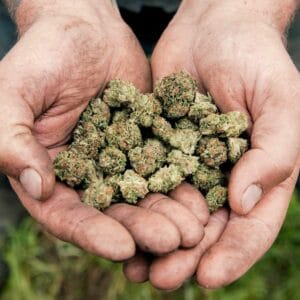
Brother David’s buds
Brother David’s is the brand to be inside dispensaries educating consumers and budtenders in the trade. And we’re not-for-profit because we want to make clear that we’re not here trying to just grab market share for its own sake. We want to see Sun+Earth flourish; we want to see all our competitor brands start using Sun+Earth Certified flowers, and soon to be able to see dispensaries being able to merchandise like 20 brands that are all using Sun+Earth Certified flower. In the same way when you go to a natural foods store you’ll see, like, USDA organic sections. That’s the dream and vision, and we’re starting to see brands like Chemistry, Farmer and the Felon, and others starting to use Sun+Earth Certified flower, so it’s really starting to gain traction. Basically the mission is to promote Sun+Earth Certified cannabis farms that are doing it the right way.
SHELBY: Right. So it seems to me that with Brother David’s you’re trying to show this isn’t greenwashing, which tends to happen not only in cannabis but in many different industries. Is that right?
DAVID: Unfortunately, yes—that’s it. It happens all the time. So yeah, Sun+Earth is super credible. We’ve got some real aces involved. In fact, Andrew Black, who’s the executive director of Sun+Earth, came from Oregon Tilth, which is Dr. Bronner’s organic certifier. So it’s a very credible, high-bar certification.
SHELBY: So what in your background led you to become passionate about sustainable, regeneratively-grown cannabis?
DAVID: Well, I guess my journey started with industrial hemp. We put hempseed oil into Dr. Bronner’s soaps back in ‘99. I read The Emperor Wears No Clothes by Jack Herer, and he exposed the whole hidden history of hemp in the US and globally. This history had been systematically covered up; but in fact, hemp was one of the most important crops in US history. It was illegal not to grow hemp on your farm in Jamestown—10 percent of your farm had to be for growing hemp. All the canvas covered wagons going west, all the clipper ships and their sails and their ropes, all our clothes—it was all hemp. But then that history was basically buried with prohibition.
We were really excited about the renaissance of the crop in the 90’s to show the incredible benefits that this dual fiber-seed crop had. And hemp is at the nexus of drug policy reform—it was the most ridiculous example of this out-of-control drug war that would schedule a non-drug agricultural crop as a Schedule I substance.
But then also for regenerative, sustainable agriculture, it was for me my first kind of, wow—we are really farming in the wrong way. Hemp grows like a weed; you can farm it with very little synthetic fertility. It lends itself well to an organic system. But pretty soon we figured out that while hemp is pretty awesome, it’s not the solution to all the world’s problems. It’s more about a regenerative, organic management approach to every single crop we grow, whether that’s hemp or palm or soy. Everything can be grown in a totally regenerative way, or a degenerative way. That’s generally what happens. Like most agricultural commodities farmed on huge plantations and monocultures, synthetic fertility and pesticides destroy the life in the soil. The soil becomes a dead, inert dirt, rather than this thriving, living ecosystem. And when that soil is destroyed, then all the life is oxidized and you get huge amounts of greenhouse gasses into the atmosphere. Something like one third of greenhouse gas is from mismanaged agricultural lands. So it’s a huge problem globally.
And so, for example, palm is one of the ingredients in our bar soap, and it’s generally farmed in this horribly destructive way in Indonesian Borneo. They rip up rainforests to put in these palm plantations, they disrupt farming communities off their land, and then they go to work for slave wages on plantations. It’s very environmentally destructive and socially destructive.
So we’re starting to see this, and in parallel we’ve been fighting hard to end cannabis prohibition. I’ve been engaged for 20 years, and really broke through finally in 2012 with Washington and Colorado, and in 2014 we got Oregon and DC, and then 2016 ran the tables. But with legalization, we really weren’t focusing on the other side—we were just against the horror of prohibition and unfortunately not really thinking about what the legal market would look like on the other side. It became apparent that the regulations really favor these big, corporate, indoor grows that were displacing the small cannabis craft farmers in the exact same way that was happening with palm, and coconut, and every other major legal ag commodity. Whatever magical thinking we had that cannabis was going to be uniquely more conscious and awesome—we were seeing the exact same corporate takeover and corporatization of agriculture happen to cannabis that was happening in every other agricultural commodity that we deal in. I mean, one third of the earth’s surface is under agricultural management, and how we farm is going to make or break the climate crisis and whether we make it. We need to shift globally how we farm and feed and clothe ourselves and how we make our medicine; they all need to be coming from regenerative farms that are self-regenerating and not reliant on external synthetic inputs that have huge petrochemical and fossil-fuel footprints.
I’m very passionate about the ability of psychedelics and cannabis to heal us on a super deep level and connect us to our more authentic, deeper, truer selves, and to nature. But equally important is like, how do we grow these medicines, and are we respecting them to give us a vision and a connection? We need to be conscious about our purchasing decisions.
So when we think about food, your plate is like a farm, and your fork is a pitchfork, and your knife is a butchering knife. How we choose what we eat is going to show up in the world. Are we supporting a farmer that’s able to take care of their land and their people and their animals in the right way, and have thriving livelihoods for their families and their workers and their communities? Or are we just defaulting and being unconscious and defaulting to the machine that’s ripping the world apart and ripping communities apart? That’s the decision we make with cannabis and every other agricultural product, you know—what are we supporting? Are we supporting a farmer who’s doing awesome stuff and doing right by their community and their workers and their land? Or are we just buying flowers from a fossil fuel-intensive, corporate indoor grow?
I feel like the industry really needs to move to this more, like, wine—when you buy wine you don’t say, okay, I want to know how much alcohol is in this wine and I want to know if these grapes are grown indoors. It’s kind of crazy where the cannabis industry is at and I feel like it’s temporary, that in the next 10 years we’re going to see a massive shift away from these very fossil fuel-intensive indoor operations towards more sun-grown. So Sun+Earth is our contribution to helping make that shift.
SHELBY: Right. So for those who aren’t super familiar with the methods behind regenerative agriculture, could you paint a picture of what some of those practices would look like?
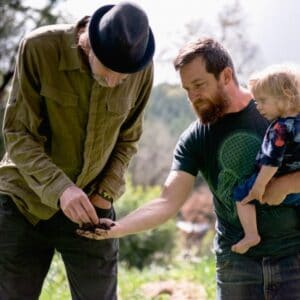
David Bronner with a Sun+Earth Certified farmer
DAVID: Yeah, so for perennial crops—which cannabis is, and that means it lives for a season—versus an annual crop, which is a tree system, there are different practices in either kind of system. In an annual system, it’s basically about biodiversity; you want to have not just a monoculture. Generally you’ll either intercrop with other cash crops or vegetables or cover crops that are complementary and building fertility in the soil. You’re basically using nitrogen-fixing cover crops to build fertility. So naturally, rather than rely on synthetic fertility, you want to keep your soil covered generally. When you look at nature, you don’t see a bunch of bare ground; when you stab bare ground, you’re going to have erosion. You’re going to lose a lot of the fertility if you’re not keeping that covered. So cover crops, fertility-building cover crops, smart crop rotations, having perimeter plantings that are pollinator and predator insect-friendly so that you can have natural pest control and natural pollination, having these smart perimeter plantings and minimal soil disturbance, minimal tillage. I mean, you have to disturb the soil somewhat, but you’re trying to minimize that so that you’re not disrupting the mycorrhizal fungi and microbiota that are in synergy with their plants. When you’re doing this right, you’re building top soil fertility just through natural photosynthesis; a plant is taking the carbon dioxide from the air and making the carbohydrates that make the roots, shoots, and leaves of the plant. 20 to 40 percent of the carbohydrates are excavated into the soil to feed the mycorrhizal fungi and microbiota that then in turn are feeding the plants. So when we’re feeding that cycle, then we’re going to be able to get nutrient-dense food, beautiful medicine—everything you could possibly want without relying on a bunch of synthetic chemicals that are very disruptive to that soil and natural ecosystem functioning.
SHELBY: I imagine this is all of benefit to the consumer as well. You mentioned something interesting a little while ago about how when we’re choosing our wine, we’re not looking for the alcohol content, and it seems that in the current industry, maybe the equivalent is the THC content. But how in particular—how is consuming regeneratively-grown cannabis such as Brother David’s or another Sun+Earth Certified brand beneficial for consumers?
DAVID: Well number one, you’re not going to have any pesticide residues or any kind of weird chemical or whatever. But it also is about the terroir. You know, when you think about wine and food it’s like the terroir of the land. Like, all the elements that come together to make that unique land and place special. So when you’re farming in a Sun+Earth way, you’re really honoring the elements of nature and the natural processes, and that is all being crystallized in the flower, and that flower reflects all that kind of magic of that land and of the people. It’s the same way with fine wine—it’s all about the terroir and reflecting the love and the care of the land and the people. You can just feel it energetically. And the Sun+Earth farmers we’re working with are the top. I mean, you would not be able to know that your flower is not indoor. The quality is, it’s top notch. I think the vibration of a Sun+Earth flower is way better than an indoor flower.
SHELBY: And then part of that also, I would imagine, involves supporting these smaller farms as well. Smaller farms and maybe Black or Brown-owned farms as well—reinvesting in the communities who have been most disadvantaged by the War on Drugs.
DAVID: Yeah, equity is a huge part of the equation here. As much as we can be helping our Black and Brown brothers and sisters succeed in this industry—obviously the Drug War has disproportionately ravaged people of color and their communities. Honestly, the Mendocino and Humboldt outdoor growing regions are a pretty white kind of landscape. But finding Black and Brown partners is key. And the way we’ve been showing our gratitude or obligation is we’ve been sponsoring or sending funds to organizations like the Hood Incubator that works with Black and Brown entrepreneurs in the cannabis space to help them succeed. And generally we need to fight for policies that help right the historical wrongs.
SHELBY: That’s so important. So, if you had one tip to convey to consumers about choosing your cannabis and consuming conscientiously, do you have any sort of advice for them?
DAVID: Yeah. I mean, treat your medicine like food. You know, when you buy food, you should be thinking about organic or regenerative organic; you don’t want your food being grown in a soup of pesticides, in a way that’s destroying the land, by migrant labor that’s completely exploited and is kind of a horror show, that’s a contributor to the climate crisis and why we’re so out of balance. That same ethic of being careful about what kind of food we eat, that same ethic should be involved when you’re buying cannabis flowers or any agricultural commodity. It’s either coming from a place where you’re respecting land, respecting the labor, respecting the farmers, or it’s not. That’s the crucial choice confronting us as consumers; are you going to choose—whatever it is—are you going to choose in a way that’s environmentally and socially beneficial, or not? And so, it’s not just Sun+Earth—there are other really cool programs out there. DEMPure is one we really respect. But just looking for some kind of certification that your flower’s being produced under the sun, in the soil, no chemicals with fair labor is pretty crucial.
SHELBY: Nice words of wisdom to end on. Thank you so much for taking the time to talk today. For those listening, you can find Brother David’s and other Sun+Earth certified cannabis brands at Torrey Holistics or you can check it out on our website, torreyholistics.com. So thank you, David. Once again, I’m Shelby with Torrey Holistics and we’ll see you next time.
DAVID: Right on. Thanks for having me.
These statements have not been evaluated by the FDA. Nothing said, done, typed, printed or reproduced by Torrey Holistics is intended to diagnose, prescribe, treat or take the place of a licensed physician.
About the Author
